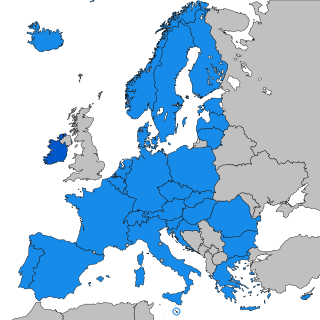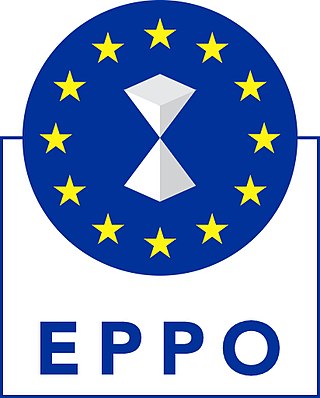
The European Union (EU) is a supranational political and economic union of 27 member states that are located primarily in Europe. The union has a total area of 4,233,255 km2 (1,634,469 sq mi) and an estimated total population of nearly 447 million. The EU has often been described as a sui generis political entity combining the characteristics of both a federation and a confederation.

The Schengen Information System (SIS) is a governmental database maintained by the European Commission. The SIS is used by 31 European countries to find information about individuals and entities for the purposes of national security, border control and law enforcement since 2001. A second technical version of this system, SIS II, went live on 9 April 2013. An upgraded Schengen Information System entered into operation on 7 March 2023.

The Schengen Agreement is a treaty which led to the creation of Europe's Schengen Area, in which internal border checks have largely been abolished. It was signed on 14 June 1985, near the town of Schengen, Luxembourg, by five of the ten member states of the then European Economic Community. It proposed measures intended to gradually abolish border checks at the signatories' common borders, including reduced-speed vehicle checks which allowed vehicles to cross borders without stopping, allowing residents in border areas freedom to cross borders away from fixed checkpoints, and the harmonisation of visa policies.

The European Communities (EC) were three international organizations that were governed by the same set of institutions. These were the European Coal and Steel Community (ECSC), the European Atomic Energy Community, and the European Economic Community (EEC); the last of which was renamed the European Community (EC) in 1993 by the Maastricht Treaty establishing the European Union. The European Union was established at that time more as a concept rather than an entity, while the Communities remained the actual subjects of international law impersonating the rather abstract Union, becoming at the same time its first pillar. In the popular language, however, the singular European Community was sometimes inaccurately used interchangeably with the plural phrase, in the sense of referring to all three entities. The European Coal and Steel Community ceased to exist in 2002 when its founding treaty expired. The European Community was merged with the second and third EU pillars by the Treaty of Lisbon in 2009, finally allowing the European Union to move beyond being only a concept and to assume the shape of a legally incorporated international organization with juridical personality, designated as the legal successor to the Community. However, the reformed EU has not become entirely unified, because Euratom, though governed with the EU by the common set of institutions, has been retained as an entity distinct from the EU, along with a number of other international entities, such as the European Investment Bank, the European University Institute, the European Stability Mechanism, and the Unified Patent Court.

The Treaty of Amsterdam, officially the Treaty of Amsterdam amending the Treaty on European Union, the Treaties establishing the European Communities and certain related acts, was signed on 2 October 1997, and entered into force on 1 May 1999; it made substantial changes to the Treaty of Maastricht, which had been signed in 1992.

Europol, officially the European Union Agency for Law Enforcement Cooperation, is the law enforcement agency of the European Union (EU). Established in 1998, it is based in The Hague, Netherlands, and serves as the central hub for coordinating criminal intelligence and supporting the EU's member states in their efforts to combat various forms of serious and organized crime, as well as terrorism.

Between 1993 and 2009, the European Union (EU) legally comprised three pillars. This structure was introduced with the Treaty of Maastricht on 1 November 1993, and was eventually abandoned on 1 December 2009 upon the entry into force of the Treaty of Lisbon, when the EU obtained a consolidated legal personality.
- The European Communities pillar handled economic, social and environmental policies. It comprised the European Community (EC), the European Coal and Steel Community, and the European Atomic Energy Community (EURATOM).
- The Common Foreign and Security Policy (CFSP) pillar took care of foreign policy and military matters.
- Police and Judicial Co-operation in Criminal Matters (PJCCM) brought together co-operation in the fight against crime. This pillar was originally named Justice and Home Affairs (JHA)

The European Public Prosecutor's Office (EPPO) is an independent body of the European Union (EU) with juridical personality, established under the Treaty of Lisbon between 22 of the 27 states of the EU following the method of enhanced cooperation. It is based in Kirchberg, Luxembourg City alongside the Court of Justice of the European Union (CJEU) and the European Court of Auditors (ECA).

The European Border and Coast Guard Agency, commonly known as Frontex, is an agency of the European Union headquartered in Warsaw, Poland, exercising in coordination with the border and coast guards of member states the border control of the European Schengen Area, a task within the area of freedom, security and justice domain.

The Directorate-General for Justice and Consumers is a Directorate-General of the European Commission. The role of the body is to ensure that the whole European Union (EU) is an area of freedom, security and justice. The specific tasks and responsibilities of the DG are laid down by the Treaty of Rome, the Treaty of Amsterdam which came into force on 1 May 1999 and the conclusions of the European Council meeting in Tampere (Finland) in October 1999.

The Prüm Convention is a law enforcement treaty which was signed on 27 May 2005 by Austria, Belgium, France, Germany, Luxembourg, the Netherlands and Spain in the town of Prüm in Germany, and which is open to all members of the European Union, 14 of which are currently parties.

In general, the law of the European Union is valid in all of the twenty-seven European Union member states. However, occasionally member states negotiate certain opt-outs from legislation or treaties of the European Union, meaning they do not have to participate in certain policy areas. Currently, three states have such opt-outs: Denmark, Ireland and Poland. The United Kingdom had four opt-outs before leaving the Union.
European Union (EU) concepts, acronyms, and jargon are a terminology set that has developed as a form of shorthand, to quickly express a (formal) EU process, an (informal) institutional working practice, or an EU body, function or decision, and which is commonly understood among EU officials or external people who regularly deal with EU institutions.

The Schengen Area is an area comprising 27 European countries that have officially abolished all passport and all other types of border control at their mutual borders. Being an element within the wider area of freedom, security and justice policy of the European Union (EU), it mostly functions as a single jurisdiction under a common visa policy for international travel purposes. The area is named after the 1985 Schengen Agreement and the 1990 Schengen Convention, both signed in Schengen, Luxembourg.

The Directorate-General for Migration and Home Affairs is a Directorate-General of the European Commission. The role of the body is to ensure the EU's security, to build a common EU migration and asylum policy, and to promote dialogue and cooperation with non-EU countries. Thereby, it contributes to the area of freedom, security and justice (AFSJ).

The Justice and Home Affairs Council (JHA) is one of the configurations of the Council of the European Union and is composed of the justice and home affairs ministers of the 27 European Union member states.

The Treaties of the European Union are a set of international treaties between the European Union (EU) member states which sets out the EU's constitutional basis. They establish the various EU institutions together with their remit, procedures and objectives. The EU can only act within the competences granted to it through these treaties and amendment to the treaties requires the agreement and ratification of every single signatory.

The European Union Agency for the Operational Management of Large-Scale IT Systems in the Area of Freedom, Security and Justice (eu-LISA) is an agency of the European Union (EU) that was founded in 2011 to ensure the uninterrupted operation of large-scale IT systems within the area of freedom, security and justice (AFSJ), that are instrumental in the implementation of the asylum, border management and migration policies of the EU. It began its operational activities on 1 December 2012. The current establishing regulation entered into force on 11 December 2018, repealing the previous regulation and expanding the Agency's mandate. The new mandate strengthens the Agency's capacity to improve, design and develop information systems for European security, border management and migration, and broadens the scope of the Agency's work on research, innovation, testing and on the possibility to support the development of pilot projects and proofs of concept.
Migration and asylum policy of the European Union - is a policy within the area of freedom, security and justice, established to develop and harmonise principles and measures used by member countries of the European Union to regulate migration processes and to manage issues concerning asylum and refugee status in the European Union, in particular in the Schengen Area.

The United Kingdom was a member state of the European Union and of its predecessor the European Communities from 1973 until 2020. Since the foundation of the European Communities, it has been an important neighbour, and was a leading member state until its withdrawal from the EU on 31 January 2020 as a result of Brexit, ending 47 years of membership.



















